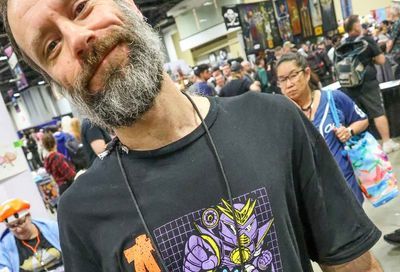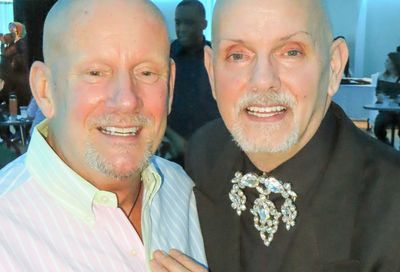Virginia Plaintiffs Respond to Defendants’ Marriage Appeal
Attorney General Mark Herring, legal teams urge court to uphold decision overturning same-sex marriage ban
Supporters of marriage equality seeking to overturn Virginia’s constitutional amendment banning same-sex marriage, along with the office of Virginia Attorney General Mark Herring, filed appellate briefs April 11 in the case of Bostic v. Schaefer urging the Fourth Circuit Court of Appeals to uphold a ruling by U.S. District Court Judge Arenda L. Wright Allen finding the marriage ban unconstitutional.
Allen, a federal judge for the Eastern District of Virginia, ruled in February that the ban violates the due process and equal protection clauses guaranteed under the 14th Amendment of the U.S. Constitution.
On Friday, Herring explained why the court should apply the most demanding ”strict scrutiny” standard to Virginia’s same-sex marriage ban, why the ban fails the ”strict scrutiny” and ”rational basis” tests, and why the court should act now to protect the fundamental right to marriage that is denied to same-sex couples in the commonwealth.
”All Virginia families deserve to be treated fairly and equally, and that, our Constitution guarantees to each of us,” Herring said in a statement released by his office. ”I remain committed to ensuring both sides of this argument are heard in court as this case advances so we can get a definitive ruling, but since I changed the Commonwealth’s legal position in January, every federal court that has considered the question has agreed that marriage equality is constitutionally required, including the resounding opinion in our favor in Virginia.”
Herring’s brief also refutes arguments made by the appellants, clerks George E. Schaefer of Norfolk and Michelle McQuigg of Prince William County, as well as 21 others who filed amicus briefs. Herring says the ban should be subject to strict scrutiny because of discrimination and animus against gay people and their lack of political power under Virginia’s laws.
Among other arguments put forth by the opponents of same-sex marriage, Herring points out that while some Virginians may have voted for the Marshall-Newman Amendment banning same-sex marriage in 2006 to ensure that their ”strongly held values” were ”reflected in the law,” religion cannot justify state-sponsored discrimination.
Herring also took aim at arguments advanced by McQuigg labeling marriage as necessary for procreation, noting that ”it is irrational to think that banning same-sex marriage will make heterosexual couples more likely to marry and have children of their own,” and that there is no evidence that same-sex marriage harms heterosexual marriage.
Herring also defended same-sex families who are harmed by the ban by attacking McQuigg’s argument that banning same-sex marriage is necessary to protect children. Herring wrote that McQuigg ”fails to explain why [the state] has a compelling interest in excluding gay people from marriage, thereby making it harder for gay parents to raise their children. McQuigg does not even mention the legal and economic benefits of marriage that are locked away from same-sex couples – such as spousal privilege, tenant-by-entirety ownership, inheritance rights, statutory beneficiary status and medical decision-making authority, to name a few.”
Herring’s brief also states that Virginia State Registrar of Vital Records Janet Rainey will continue to enforce the ban on same-sex marriage until a definitive judicial decision can be rendered. Herring asked that any injunction against the ban be stayed until the U.S. Supreme Court resolves the issue.
Besides Herring, the legal team of Ted Olson and David Boies, lead counsel in the Bostic v. Schaefer case, also filed a brief arguing that Virginia’s marriage prohibition is unconstitutional and must be subject to heightened scrutiny.
”Virginia has singled out gay men and lesbians and enshrined in Virginia’s Constitution and statutory code that they are different, that their loving and committed relationship are ineligible for the designation ‘marriage,’ and that they and the children they raise are unworthy of that ‘most important relation in life,”’ the legal team wrote in its brief.
”No less than Virginia’s anti-miscegenation laws, Virginia’s Marriage Prohibition flatly contradicts the ‘cherished protections’ that Due Process and Equal Protection Clauses provide for ‘private choices of the individual citizen regarding love and family.”’
Adam Umhoefer, the executive director of the American Foundation for Equal Rights (AFER), which is sponsoring the Bostic v. Schaefer case, said the foundation looked forward to presenting its case before the Fourth Circuit on behalf of thousands of gay and lesbian Virginians and their families.
”In the last five months, every federal judge to rule on the question of marriage for gay and lesbian Americans has decided in favor of equality,” Umhoefer said, ”And we are confident the momentum will continue through this appeal at the Fourth Circuit.”
Lawyers for two other couples, in Harris v. Rainey – a case seeking to overturn the marriage ban from the Western District of Virginia that was previously certified as a class action lawsuit – also submitted briefs to the court arguing that the ban violates the 14th Amendment and should be subject to ”heightened scrutiny” because of systematic discrimination against same-sex couples by the commonwealth of Virginia, which does not recognize any form of relationship or contract between same-sex couples, even if they are legally married elsewhere.
”Although heightened scrutiny is required, Virginia’s marriage bans are unconstitutional under any standard of review,” counsel for the Harris plaintiffs, which included lawyers from Lambda Legal, the American Civil Liberties Union (ACLU), the ACLU of Virginia and the law firm Jenner and Block, wrote in their brief. ”Tradition is not a legitimate purpose that, standing alone, can justify disparate treatment.”
Like Herring and the Bostic lawyers, the Harris legal team also refuted arguments claiming there is a compelling state interest in preventing same-sex couples from marrying.
”The lack of any rational connection between Virginia’s marriage bans and a legitimate state interest reinforces the inevitable conclusion that the primary purpose and practical effect of the bans is to impose a disadvantage, a separate status, and so a stigma upon same-sex couples in the eyes of the state and the broader community, rendering the bans unconstitutional.”
The appellants and opponents of same-sex marriage are required to submit briefs responding to the plaintiffs’ and Herring’s arguments by April 30. The Fourth Circuit, in Richmond, is scheduled to hear oral arguments in the case on May 13.
Support Metro Weekly’s Journalism
These are challenging times for news organizations. And yet it’s crucial we stay active and provide vital resources and information to both our local readers and the world. So won’t you please take a moment and consider supporting Metro Weekly with a membership? For as little as $5 a month, you can help ensure Metro Weekly magazine and MetroWeekly.com remain free, viable resources as we provide the best, most diverse, culturally-resonant LGBTQ coverage in both the D.C. region and around the world. Memberships come with exclusive perks and discounts, your own personal digital delivery of each week’s magazine (and an archive), access to our Member's Lounge when it launches this fall, and exclusive members-only items like Metro Weekly Membership Mugs and Tote Bags! Check out all our membership levels here and please join us today!




















